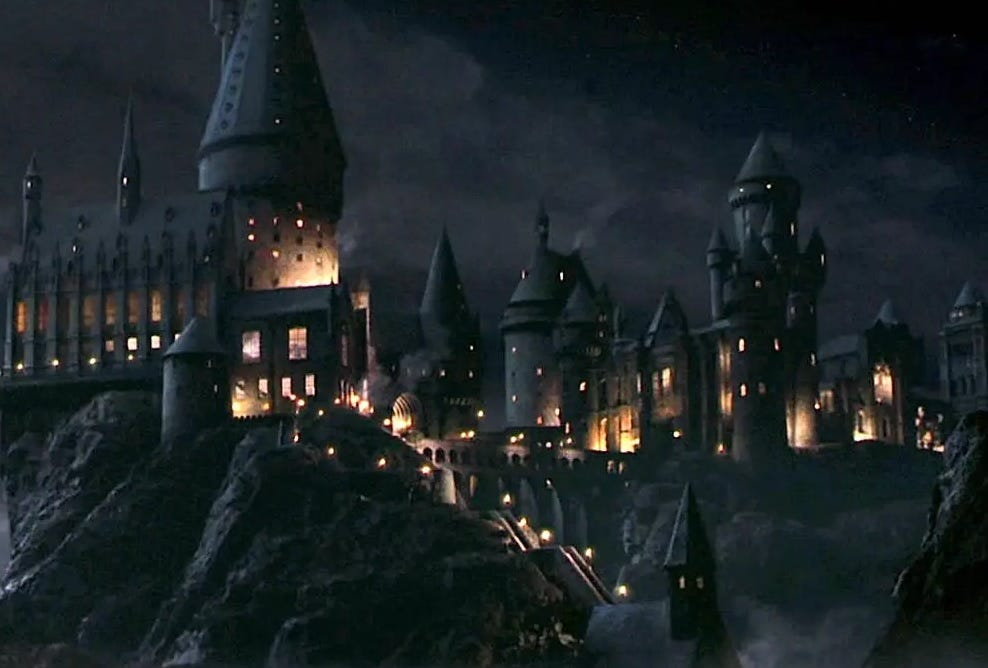Dark Academia vs. Education
Identity vs. Hard Work
This morning I’m reacting to a "Dark Academia" post by
Johann Kurtz
. I never attended either Oxbridge or a New England Liberal Arts college. My closest approach was that when I was a grad student at UMass (2009-12) we would meet at Amherst College occasionally for the Five-College History Seminar. This would consist of an elegant dinner (mostly for faculty but some grad students were invited) followed by someone reading an article or monograph chapter. Discussion would ensue -- again mostly among the professionals but sometimes a pushy grad student like myself was indulged.
My impression of Oxbridge, I have to admit, comes mostly from fiction. A bit from Neal Stephenson's Baroque Cycle. A bit more from Philip Pullman. A lot from Douglas Adams. I particularly liked the slightly ironic but still appreciative view of dinner at the high table and especially of the porter who knew everybody's name, even decades later. Just a bonus, I suppose, that the first Dirk Gently story began its life as a Doctor Who episode.
And I think Johann makes a good point about the things we have lost in Higher Ed. "There is no room for dress codes (elitist), beautiful architecture (expensive), tradition (racist), or cubby holes (inefficient). What identities are on offer in the modern university - sexual and other minorities - are resentful and ugly." On the other hand, Cecil Rhodes got his imperialist colonial worldview from a lecture on art by John Ruskin at Oxford which in retrospect could be called a bit ugly. So let's not look at the past through rose-colored glasses.
The idea seems to be that a sense of belonging must be exclusive, but doesn't this strike you as an easy way out of hard work? How would a graduate seminar with Richard Feynman feel different from an invitation to Hogwarts? I imagine it would feel no less special to be invited into what would be considered an elite assembly. But better, because it would have been based on achievement rather than on an unearned specialness one was just born with. What I think attracts us to Hogwarts, sad to say, is a desire to be special without working for it. So I disagree with the statement that "Rowling's school does not cater to your identity". Seems to me "You're a wizard, Harry!" is the ultimate statement of identity. The "otherness" just hides the "parallels with the aristocracy"; partly because we don't know Harry is an aristocrat at the beginning of the story, so we mistake him for an underdog.
One of the things I think is really influential in this romanticization of the "otherness" of bygone eras of elite Higher Ed and the desire to remake them today is this sense of unearned specialness, which I don't think we should pursue. But another is a sense that the educational experience is happening in a slightly different world or on a slightly elevated plane of being than the day-to-day realities of "Muggle" life. This is much harder to achieve these days, and it's not only a problem of brutalist architecture. Higher Education is pursued by so many people who don't have previously-unknown piles of gold available to them, giving them the opportunity to pursue only what interests them. Even elite institutions are filled with people who are (or their families are) mortgaging their futures in order to even attend. And most of the people at less-than-elite universities, colleges, and technical schools are firmly embedded in all the struggles of real life. So where and when are they going to experience that feeling of magic?
I'd suggest their best chance of reaching that feeling (which is really about community, I think) would be through achievement rather than identity. Meritocracy is a dirty word today, and I agree there are unequal opportunities that make it much more of an ideal than a reality. I'd argue that building identity groups on other distinctions (skin color, religion, gender) may improve the equity of the on-ramps. But then the person needs to walk the road. It's not enough to just sit in an identity group and claim benefits forever; just as it wasn't okay for Rhodes to extrapolate from his position of privilege that the world would be better off if Englishmen like himself were running more of it, so why not create a secret society to take back the colonies in North America?
All that said, how do we create communities where regular people rather than hereditary wizards can develop a sense of community and of the special nature of the education they're pursuing? I've had students from single-parent, working-class homes, at a very pedestrian little university where more than half our students are first-generation collegiates. These students, with seemingly no inherited advantages, have earned McNair scholarships and given presentations at national conferences. Then have gone on to graduate school. It doesn't work for everyone. There are so few jobs for professional historians that I hesitate to recommend it as a career goal. Can we create more experiences that will provide people a taste of this special feeling of belonging to a community where learning is valued? Where the feeling is associated with the work? And not with simply "being a wizard"? Can we do this outside the academy, so people who can’t attend college can join the community? Seems like that's a code we'll need to crack, if we want to return to the substance of higher education rather than just the style.


